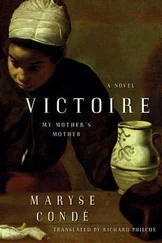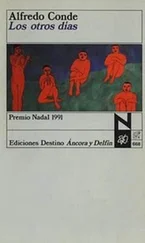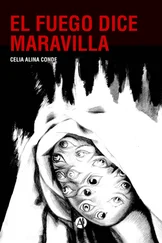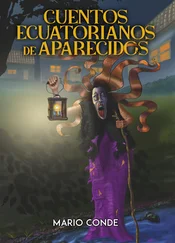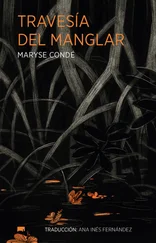“The Wayanas were runaway slaves who had fled the plantation and settled on the slopes of the Soufrière volcano. When the whites finally got round to abolishing slavery, the Wayanas stayed put. The only difference, twice a week they came down to the villages to sell their garden produce. Hidden under their bakoua hats, you couldn’t tell the men from the women. Same blackness. Same shaved heads, same scarifications — everyone was scared of them. They didn’t speak Creole, but an African language, Kilonko . It was rumored brother slept with sister, and even with the mother. A real pig swill. When they had finished selling their stuff, they piled their baskets onto their heads and went back up the mountain. One day, they came to fetch me. A Wayana girl had slipped on a rotten mango amid the market filth. Her head had hit a rock so violently she had fallen into a coma.
“I had returned home to Grande-Anse two years earlier and opened my practice on the square in front of the church. There was no lack of patients. The sick came from as far away as Grande-Terre to consult me. They couldn’t get over seeing a mulatto, an islander like them, doing what I was doing. They begged me to go into politics, to run for a seat in the Conseil Général. I had other ambitions. I researched, I experimented. I had invented a cure for dengue fever. I had invented a way of replacing broken hips in older people with an artificial one. But Frankenstein remained my dream, and I too burned with desire to assemble the elements of life to produce my creature. In secret, I conducted experiments on rats, mice, and voles. That morning, I grabbed my bag and ran to the market. The Wayana girl was lying on the ground, her head dripping with blood. I had a great deal of trouble reviving her. She finally opened her eyes. I must confess I soon realized I didn’t love Ofusan. For me, she was a way of getting my revenge. On my father. On my mother, who had lived her whole life in servitude and adoration of the whites. On all those light-skinned girls she presented me with to whiten her blood. On the mulatto clique in Grande-Anse, who aped the very same families who had lashed their parents. On our wretched society, whose only concern was the color of money. Whereas poor Ofusan worshipped me. She was a saint. But men like me have no time for saints. They’re only interested in bòbòs, loose women who stink of sweat under their patchouli. For me, Ofusan learned to speak Creole and French, two languages the Wayanas despised. For me, she had herself baptized. She attended catechism classes. She took her first communion, and then on April 27 we were married before God and before mankind. Ever since our wedding night, making love to her had been a problem. Her purity repelled me. My member, always sprightly, had never, oh never, played tricks on me — you know full well up till this very day it has never let me down — it became as squishy as blotting paper soaked in water. In order to get the tiniest erection I had to imagine she was one of my whores lying in bed beside me.
“I should now give you a description of Grande-Anse. It lies on the windward side of the island, in the middle of the sugarcane basin. On one side, the green of the cane fields; on the other, the blue of the ocean. It used to be a fairly big agglomeration: a mess of cowpatlike huts piled into neighborhoods — Front-de-Mer, Bélisaire, Carénage, and Bas-
de-la-Source. What they called the town, Grande-
Anse itself, was the residential district. It was composed of the cathedral Saint-Pierre-et-Saint-Paul, the balconied, mansarded houses belonging to a handful of dignitaries, the boys’ school for Christian instruction run by the monks, the girls’ day school run by the sisters of Saint-Joseph-de-Cluny, the Saint-Jean-
Bosco orphanage, city hall, the dispensary, and the police offices recently opened in a former rum purging station. All around it were the whorehouses. Whorehouses galore! There must have been at least a dozen. The black and mulatto women whom emancipation had liberated from the cane fields and the great houses, and who had nothing to fill their bellies with, flocked to them. As for the white Creole planters, they did the same and paid a fortune for what they had always taken free of charge. Behind every girl there was a black or mulatto pimp. On the side I was the physician to the most popular whorehouse in Grande-Anse, called the Ginger Moon. There’s a long story to it! My mistress at the time was a certain Carmen, a bòbò from Santo Domingo, matured by experience the way I like them, whom I had cured of a case of furunculosis. One day she came to ask for help. She was fed up selling her body to one and all. She wanted a rest and to get others to work for her. So she had the idea of opening a whorehouse and asked me to lend her some money. I accepted on one condition. I would be in charge of hygiene. The place would be spotless. Disinfectant and bleach. Every three months I would give the girls a checkup so they wouldn’t contaminate the customers with the chancre, clap, syphilis, and what have you. She said, You’ve got a deal, and we were on a roll. And what a roll! Sometimes the white Creoles would be lining up in the corridor. There were mulattoes too, whom I used to see take communion on Sundays beside their wives. As for the blacks, it wasn’t girls they fought over. Believe me, they had other things to think about at the time. One night, I had an urge to see Carmen. I shall never forget that night. It was in September. It was pouring down in bucketfuls, and the claps of thunder would have awakened the dead. Since d’Artagnan, my Arab stallion, was scared of lightning, I walked to the Ginger Moon, wading in water up to my stomach. Soaked to the skin, I was about to go up to see Carmen when a young girl came out of one of the rooms. I had never seen her before. She must have been fourteen or fifteen, in any case no older. No taller than a tuft of guinea grass. Certainly no bigger. Her skin was shiny black. Her hair, a stream of oil flowing down her back. Even so, despite her hair, she didn’t look like a coolie. Rather a hodgepodge of Chinese and black mixed in with Carib blood. The way she swept past me without even a glance, I can’t even begin to tell you the effect it had on me. I arrived quite out of breath and asked Carmen:
“Tiny. Slender. A spark on a bonfire. Who is she?”
“She burst out laughing. ‘The way you speak! It’s Pisket. She hasn’t been here a week. And already the men are mad about her. Do you want to try her?’
“And how! I had no sooner tried the girl, I was mad about her as well. I had to have her morning, noon, and night. She was my morning cassava bread, my noontime red snapper, and my evening bush tea. Soon, I could no longer bear another man touching her. I would have liked to lock her away and keep her all for myself. But I imagined the scandal it would have caused in Grande-Anse and all over Guadeloupe. A man like me whom everyone respected. Me, Dr. Jean Pinceau—”
Hakim gave a start, since the name rang a bell in the thick fog of his stupor.
“What did you say your name was?” he asked.
“Pinceau. Funny name, isn’t it? It’s the name of my mother’s family, a family of talented free blacks since the early eighteenth century. The Pinceau men were locksmiths. The women, seam-stresses and milliners…. So I didn’t dare do anything more about it and merely settled Pisket in a room next to Carmen’s in the attic. She had her own washroom with her pitchers and basins. I paid a servant to cook, wash, and iron her clothes. Believe me, Pisket was a real character. I never knew where she was born, who her parents were…. At first I didn’t even know her real name. Pisket was a nickname she had earned because she was so slender. She was all skin and bones. Carmen knew no more about her than on the day she picked her up while she was making love on a plot of waste ground in Grande-Anse. The fact was, she seldom uttered a word, barely a sound came out of her mouth. You never knew whether she was happy or upset, whether she liked doing it, whether she wanted more. A real autist. It was probably that which got me so excited. I never knew whether she was fond of me or what her feelings were. I had to have Carmen watch her. For as soon as I had my back turned, she took in men. Not for money. Not for pleasure. Just like that. Like a machine. It made me so angry! Can you imagine, me jealous of a bòbò! But she always managed to outsmart Carmen and put a man in her bed. There was this Kung Fui, a Chinese half-caste like herself, a weird guy, who was always in her room and even slept in her bed. When I got angry, she vowed he was her brother! There was also a third rogue, more Chinese than black or Indian, always in their company, but who never stayed at the Ginger Moon. What’s more, Pisket smoked opium. However often I smashed her instruments and broke her pipe, she would always begin again. She was allergic to hygiene too. She was like a cat: hated water. When she got too funky, I would stuff her in a tub of hot water. I would scrub her shoulders and her you-know-what with a bunch of leaves. But there was nothing I could do about it. I wallowed in her filth.
Читать дальше



